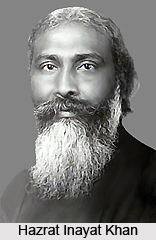 Hazrat Inayat Khan was born in a family of musicians in the year of 1882 in Vadodara, Gujarat. His house was quite like a meeting place for various people related to cultural activities like the poets, composers mystics and thinkers. Hazrat Inayat Khan got up amidst the scholarly discussion among them and that discussion did a great job to generate sympathy for many different religions in the young mind of Inayat Khan.
Hazrat Inayat Khan was born in a family of musicians in the year of 1882 in Vadodara, Gujarat. His house was quite like a meeting place for various people related to cultural activities like the poets, composers mystics and thinkers. Hazrat Inayat Khan got up amidst the scholarly discussion among them and that discussion did a great job to generate sympathy for many different religions in the young mind of Inayat Khan.
Hazrat Inayat Khan was quite expert in playing the traditional Indian music instrument, `Veena` as he was born in a musician`s family. He was quite popular among the music lovers all over India and his popularity provoked him to organize numerous concerts throughout India, at a very young age of eighteen. His main objective behind organizing the concerts was to revive the older folk songs and this also enhanced his fame a lot. A number of Emperors invited him in their own courts. In the meantime he began to seek spiritual guidance.
While seeking spiritual guidance he chose Mohammed Abu Hassan as his revered teacher. He spent a long period of four years with him. He reached a certain level of realization during this period and God became a reality in his life, through that experience. After completing his spiritual lessons, his Guru instructed him to spread his thoughts and knowledge all over the world. He went on a world tour. He first went to America and later reached Europe for disseminating the message of oneness of all religions. He married Ora Ray Baker from New Mexico and they had had four children. They settled in Suresnes, near Paris. He was the founder of the "Sufi Order in the West" in 1914 in London.
He had put forward ten thoughts that form the foundational principles of Universal Sufism:
* There is One God.
* There is One Master who is the Guiding Spirit of all souls and leads all followers toward the Light.
* There is One Holy Book, the Sacred Manuscript of Nature that can enlighten the reader.
* There is One Religion which fulfils the purpose of every soul.
* There is One Law, the Law of Reciprocity, which can be observed by a selfless conscience along with a sense of aroused justice.
* There is One Brotherhood, the human brotherhood.
* There is One Moral, the Love that springs from a willing heart, surrendered in service to God and Humanity.
* There is One Object of Praise, the Beauty that uplifts the heart of its worshipper through all aspects.
* There is One Truth, the true knowledge of our being which is the quintessence of Wisdom.
* There is One Path, the obliteration of the false ego which raises the mortal to immortality.
He passed away due to influenza in New Delhi in the year of 1927.









